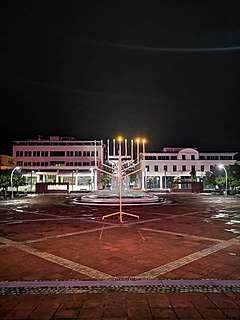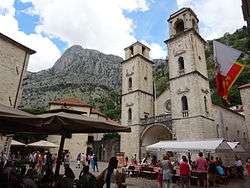Religion in Montenegro
Religion in Montenegro refers to adherents, communities, institutions and organizations of various religions in Montenegro. While Eastern Orthodox Christianity is the dominant religious denomination in Montenegro, there are also sizable numbers of adherents of both Catholic Christianity and Islam. The dominant Church is the Serbian Orthodox Church although traces of a forming Montenegrin Orthodox Church are present.
Distribution
The results of the Montenegrin census of 2011 by ethnic groups, the latest census in which the indication of identification (whether by confession or as irreligious) in the question for confession was obligatory, are as follows:
| Ethnic groups by confession |
Total | Montenegrins | Serbs | Bosniaks | Albanians | Roma | Croats | |||||||
|---|---|---|---|---|---|---|---|---|---|---|---|---|---|---|
| Number | % | Number | % | Number | % | Number | % | Number | % | Number | % | Number | % | |
| Eastern Orthodox | 446,858 | 72.1 | 248,523 | 88.7 | 177,091 | 98.3 | 11 | 0.0 | 37 | 0.1 | 516 | 8.2 | 90 | 1.5 |
| Islam | 118,477 | 19.1 | 12,931 | 4.6 | 79 | 0.0 | 74,343 | 99.7 | 22,267 | 73.1 | 5,034 | 80.5 | 3 | 0.0 |
| Catholic | 21,299 | 3.4 | 5,667 | 2.0 | 116 | 0.6 | 3 | 0.0 | 7,954 | 26.1 | 13 | 0.2 | 5,527 | 91.8 |
| Protestantism | 1,601 | 0.4 | 921 | 0.3 | 262 | 0.1 | 36 | 0.1 | 2 | 0.0 | 2 | 0.0 | ||
| Atheism/Agnosticism | 9,005 | 3.3 | 6,393 | 2.3 | 697 | 0.4 | 108 | 0.1 | 35 | 0.1 | 1 | 0.0 | 224 | 3.7 |
Christianity
Eastern Orthodoxy
Eastern Orthodox Christianity is the dominant religion in Montenegro. Adherents of Eastern Orthodoxy in Montenegro are predominantly ethnic Montenegrins and Serbs. Ethnic Serbs of Montenegro are adherents of the Serbian Orthodox Church and its dioceses in Montenegro: Metropolitanate of Montenegro and the Littoral, Eparchy of Budimlja and Nikšić, parts of Eparchy of Mileševa, and parts of Eparchy of Zahumlje and Herzegovina. Ethnic Montenegrins are divided between the Serbian Orthodox Church and the independent Montenegrin Orthodox Church (which is consider by the Serbian Orthodox Church and the other autocephalous Orthodox Churches as for this moment, a non-canonical 'schismatic' Orthodox church).[2]
Catholic Church
Most Catholics are ethnic Albanians and Croats as well as some Montenegrins. In some municipalities where Albanians form a majority, like Tuzi, are adherents of Catholic Christianity. Catholicism is also present in Boka Kotorska, where there is a significant presence of ethnic Croats.
Islam
Muslims form the largest minority religion in the country. Montenegro's 118,477 Muslims make up 19.11% of the total population.[1]
Muslims in Montenegro are divided into two main groups, and further subgroups:
- Slavic Muslims
- Bosnian-speaking ethnic Bosniak Muslims
- Montenegrin-speaking ethnic Montenegrin Muslims
- Other Slavic Muslims (Muslims by nationality), including Gorani, and other Slavs of the Muslim faith who identify by religion rather than by ethnicity.
- Albanian Muslims
- Albanian-speaking ethnic Albanian Muslims
Islam is the dominant religion in the northeastern municipalities, which are part of the Sandžak geographical region, and in municipalities where Albanians form a majority. Islam is the majority religion in Rožaje, Plav, Gusinje, Ulcinj and Petnjica.
Judaism

In February 2012, the Montenegrin Prime Minister Igor Lukšić signed an agreement with the Montenegrin Jewish community to grant official recognition of Jews as a minority in Montenegro. The agreement also established Judaism as the country's fourth official religion, along with the Catholic Church, Eastern Orthodox Christianity, and Islam.[3]
Atheism

The majority of Montenegro's population, 98.69%, declares to belong to a religion, though observance of their declared religion may vary widely.
On the census from 2011, atheists, those who declared no religion, comprised about 1.24% of the whole population, and agnostics 0.07%.
Religiosity is lowest in the Bay of Kotor region and the capital city of Podgorica.
Municipalities with highest share of atheists are Herceg Novi (2.43%), Kotor (2.03%), Podgorica (1.99%) and Tivat (1.7%). In contrast, Rožaje has the fewest atheists, who make up only 0.01% of its population.[1]
In some municipalities more than half of population are undeclared, however.
Religious freedom
Montenegro's laws guarantee the freedom of religion and outlaw several forms of religious discrimination, as well as establishing that there is no state religion in Montenegro. The government provides some funding to religious groups.
According to a 2017 survey conducted by the Council of Europe in cooperation with the Office of the Ombudsperson of Montenegro, 45% of respondents reported having experienced religious discrimination.[4]
References
- "Census of Population, Households and Dwellings in Montenegro 2011" (PDF). Monstat. pp. 14, 15. Retrieved July 12, 2011. For the purpose of the chart, the categories 'Islam' and 'Muslims' were merged; 'Buddhist' (.02) and Other Religions were merged; 'Atheist' (1.24) and 'Agnostic' (.07) were merged; and 'Adventist' (.14), 'Christians' (.24), 'Jehovah Witness' (.02), and 'Protestants' (.02) were merged under 'Other Christian'.
- Džankić 2016, p. 110–129.
- "Jewish history of Montenegro". Jewish Virtual Library. Retrieved 2012-11-16.
- International Religious Freedom Report 2017 Montenegro, US Department of State, Bureau of Democracy, Human Rights, and Labor.

Sources
- Cattaruzza, Amaël; Michels, Patrick (2005). "Dualité orthodoxe au Monténégro". Balkanologie: Revue d'études pluridisciplinaires. 9 (1–2): 235–253.CS1 maint: ref=harv (link)
- Džankić, Jelena (2016). "Religion and Identity in Montenegro". Monasticism in Eastern Europe and the Former Soviet Republics. London-New York: Routledge. pp. 110–129. ISBN 9781317391050.CS1 maint: ref=harv (link)
- Morrison, Kenneth (2009). Montenegro: A Modern History. London-New York: I.B.Tauris.CS1 maint: ref=harv (link)
- Morrison, Kenneth; Čagorović, Nebojša (2014). "The Political Dynamics of Intra-Orthodox Conflict in Montenegro". Politicization of Religion, the Power of State, Nation, and Faith: The Case of Former Yugoslavia and its Successor States. New York: Palgrave Macmillan. pp. 151–170. doi:10.1057/9781137477866_7. ISBN 978-1-349-50339-1.CS1 maint: ref=harv (link)
- Živković, Tibor (2012). De conversione Croatorum et Serborum: A Lost Source. Belgrade: The Institute of History.CS1 maint: ref=harv (link)
- Živković, Tibor (2013). "On the Baptism of the Serbs and Croats in the Time of Basil I (867–886)" (PDF). Studia Slavica et Balcanica Petropolitana (1): 33–53.CS1 maint: ref=harv (link)
External links
- Venice Commission (2015): Draft Joint Interim Opinion on the Draft Law on Freedom of Religion of Montenegro
- Venice Commission (2019): Montenegro: Opinion on the Draft Law on Freedom of Religion or Beliefs and Legal Status of Religious Communities
- Council of Europe (2019): Montenegro: Provisions on religious property rights include positive changes to out-dated legislation, but need more clarity, says Venice Commission
- Freedom of Religion or Belief in Montenegro: Conclusions (2019)
